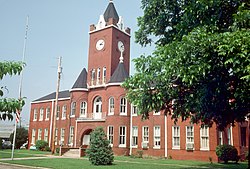Elba, Alabama
| Elba, Alabama | |
|---|---|
| City | |

Coffee County Courthouse in Elba
|
|
| Nickname(s): The City of Flowing Wells | |
 Location in Coffee County and the state of Alabama |
|
| Coordinates: 31°25′2″N 86°4′38″W / 31.41722°N 86.07722°W | |
| Country | United States |
| State | Alabama |
| County | Coffee |
| Settled | Early 1830s |
| Incorporated | April 13, 1853 |
| Government | |
| • Type | City Council/Mayor |
| • Mayor | Mickey Murdock |
| Area | |
| • Total | 15.4 sq mi (39.9 km2) |
| • Land | 15.3 sq mi (39.7 km2) |
| • Water | 0.08 sq mi (0.2 km2) |
| Elevation | 194 ft (59 m) |
| Population (2010) | |
| • Total | 3,940 |
| • Density | 257/sq mi (99.2/km2) |
| Time zone | Central (CST) (UTC-6) |
| • Summer (DST) | CDT (UTC-5) |
| ZIP code | 36323 |
| Area code(s) | 334 |
| FIPS code | 01-23296 |
| GNIS feature ID | 0117908 |
| Website | www |
Elba is a city in Coffee County, Alabama, United States. At the time of the 2010 U.S. census, its population was 3,940. Elba is part of the Enterprise micropolitan statistical area. Elba is the official county seat of Coffee County, though there are two county courthouses, with the other one being located in the town of Enterprise.
The town which eventually became Elba originated near a ferry across the Pea River in the early 1830s. Originally called Bridgeville, a U.S. post office was established in the town by 1841. In 1851, a lottery to determine a new name for the town was held. One citizen had been reading a biography of Napoleon Bonaparte, and his suggestion of "Elba" as its name was the winner when it was drawn from a hat before any of the other suggestions. Elba became the county seat of Coffee County in 1852.
A logging railroad first reached Elba on March 20, 1892, with the first permanent rail line arriving in October 1898. The "Dorsey Trailer Company" was constructed at the end of this railroad line, and this company manufactured the highway trailers that served on railroads and highways starting with the piggyback railroad or containerized cargo boom of the second half of the 20th century. The new railroad line ended in West Elba, where the "New Town" industrial section of the town was located. The Seaboard System Railroad ceased all railroad service to Elba, including freight service, on November 27, 1984.
The Pea River is an essential component of the history of Elba. The river was originally called the Talakatchee River by the Creek Indians. (In the Creek language, talak means "pea", and hatchee means "small river".) The Pea River frequently flooded, causing great damage to the town. The Lincoln flood of 1865, named for the assassination of Abraham Lincoln in the same year, was the first to destroy the town. Another devastating flood occurred in 1929 when the river crested at a depth of 43.5 feet (13.3 m) early on March 15. Airplanes were used to drop supplies to the completely inundated town. There was only one death from the flood, an African-American man named "Phoe" Larkins. A child born at the Elba Hotel during this flood was named "Noah Tucker" after the biblical character Noah. Vivian Harper received the Theodore N. Vail Silver Medal for her heroic actions during the flood.
...
Wikipedia
